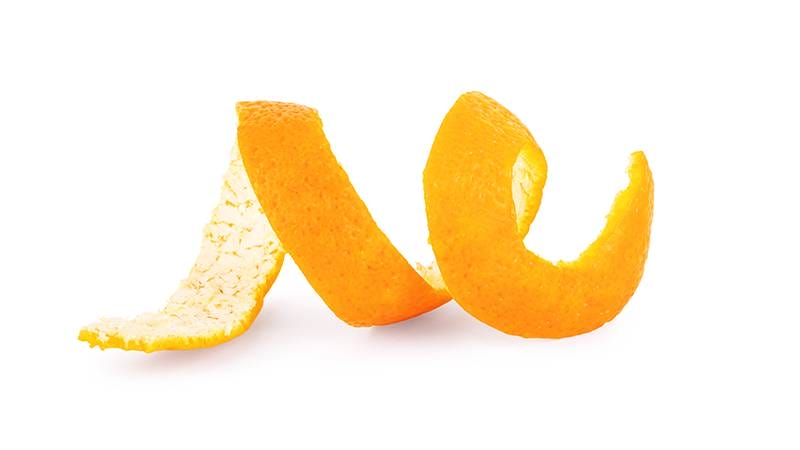Composting has always been a cornerstone of sustainable gardening, turning kitchen waste into black gold for our plants. But amidst the usual compost ingredients, there’s been a long-standing debate: can you compost orange peels?
Some gardeners swear by it, while others caution against it. In my two decades of composting and writing about it, I’ve delved deep into this citrusy conundrum. In this article, I’ll share my findings, dispel myths, and guide you on how to make the most of those vibrant orange peels in your compost pile. Let’s peel back the layers of this debate together!
Can You Compost Orange Peels?
Absolutely, you can compost orange peels! This might come as a surprise to many, given the mixed opinions floating around in the gardening community.
But based on both my personal experience and extensive research, orange peels can be a valuable addition to your compost bin. They not only bring in a rich nutrient content but also help in balancing the compost composition.
However, like all organic waste, there are certain best practices to follow when composting citrus peels to ensure optimal decomposition and garden sustainability.
Over the years, I’ve seen many a compost pile thrive with the inclusion of these citrusy wonders. So, if you’ve been holding back, it’s time to embrace those vibrant peels and give your compost a zesty boost!
Reasons Why Other People Thought You Shouldn’t Compost Citrus Peels
The hesitancy to compost citrus peels, especially orange peels, has roots in some age-old gardening myths. Historically, there’s been a belief that the acidity in citrus peels might upset the pH balance of the compost, making it less favorable for plants.
This concern, while genuine, often overlooks the fact that as orange peels decompose, their acidity diminishes, and they tend to neutralize over time.
Another prevalent misconception revolves around vermicomposting. Many gardeners have been wary of introducing citrus peels into worm bins, fearing potential harm to the worms.
It’s true that in large quantities and without proper preparation, the essential oils in citrus can be a bit strong for our wriggly friends. However, when added in moderation and well-mixed with other organic waste, worms can safely process them.
In my journey of sustainable gardening, I’ve come to realize that it’s essential to differentiate between fact and folklore. While it’s crucial to approach composting with knowledge and care, it’s equally vital not to let unfounded beliefs limit the potential of our compost piles.
How Long Does It Take for Orange Peels to Decompose in Compost?
Decomposition is a fascinating process, and when it comes to orange peels, there’s a lot to consider. On average, orange peels can take anywhere from 3 to 6 months to fully decompose in a compost pile. However, this rate isn’t set in stone and can vary based on several factors.
Temperature
Temperature plays a pivotal role. In warmer climates or during the summer months, the heat accelerates microbial activity, speeding up the decomposition of organic waste, including those zesty orange peels. On the flip side, colder temperatures can slow down the process considerably.
Moisture
Moisture is another key player in the composting game. A well-moistened compost pile facilitates the breakdown of materials, but too much moisture can lead to rot and mold, hindering the decomposition of orange peels.
Size of the Peels
Lastly, the size of the peels matters. Smaller, shredded pieces of orange peel will break down faster than large chunks, thanks to the increased surface area exposed to the compost’s microbial community.
Are Volatile Citrus Compounds a Problem in Compost?
Volatile citrus compounds, often referred to as essential oils, are the aromatic substances found in the rind of citrus fruits, including our focus, orange peels. These compounds give oranges their distinctive, refreshing scent. But when it comes to composting, there’s been some debate about their role.
In concentrated amounts, these volatile compounds can be somewhat antimicrobial. This means they have the potential to slow down the microbial activity in your compost pile, which in turn can decelerate the decomposition process. Additionally, in vermicomposting, these compounds, if not properly balanced, might be a tad strong for the worms, affecting their activity and health.
However, it’s not all doom and gloom for our citrusy additions. The key lies in moderation and preparation. By ensuring that orange peels are well-distributed throughout your compost and not clumped together, you can mitigate the impact of these compounds. Shredding or tearing the peels into smaller pieces can also help, as it dilutes the concentration of the volatile compounds and speeds up decomposition.
In the vast world of sustainable gardening, understanding these nuances ensures that we harness the full potential of every organic waste, turning challenges into opportunities for richer compost.
Benefits of Adding Orange Peels to Compost
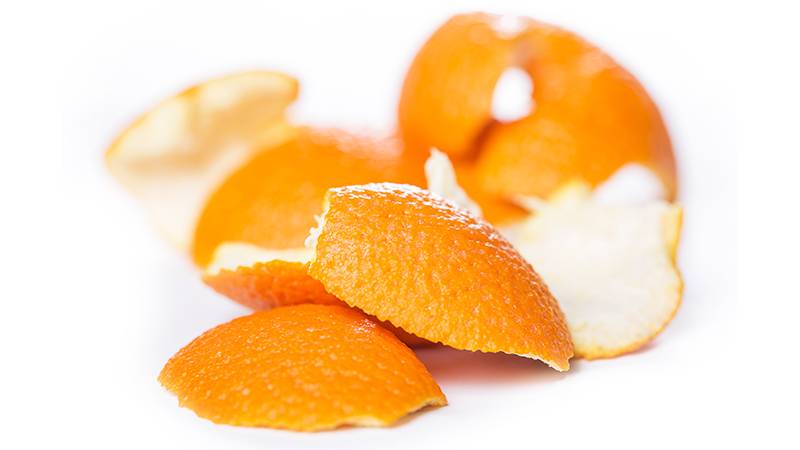
Orange peels, with their vibrant hue and zesty aroma, bring more than just a splash of color to your compost pile. Here are five standout benefits of incorporating these citrusy wonders into your compost.
Rich Nutrient Boost
Orange peels are packed with essential nutrients like nitrogen, phosphorus, and potassium. When decomposed, they release these nutrients into the compost, providing plants with the vital elements they need for robust growth and health. It’s like giving your garden a natural multivitamin!
Here’s a list of nutrients in orange peels:
| Nutrient | Percentage |
|---|---|
| Nitrogen | 1.50% |
| Phosphorus | 0.15% |
| Potassium | 1.80% |
| Calcium | 3.60% |
| Magnesium | 0.25% |
Improved Compost Texture
The fibrous nature of orange peels aids in creating a more aerated compost structure. This improved texture enhances oxygen circulation, which is crucial for microbial activity and efficient decomposition. A well-aerated compost also ensures better moisture retention.
Natural Pest Deterrent
The aromatic compounds in orange peels can act as a natural pest repellent. When integrated into compost, they can help deter certain pests from your garden beds, offering a chemical-free solution to keep those pesky intruders at bay.
Balanced pH Levels
Contrary to popular belief, decomposed orange peels can help neutralize the pH of your compost. As they break down, their acidity diminishes, contributing to a balanced compost pH, which is beneficial for a wide range of plants.
Enhanced Microbial Activity
The sugars and other organic compounds in orange peels can serve as a food source for beneficial microbes in the compost. This can boost microbial activity, accelerating the decomposition of other organic waste in the pile.
How to Compost with Orange Peels
Composting with orange peels can be a game-changer for your garden, but like all things in sustainable gardening, there’s a method to the magic. Here’s a step-by-step guide to ensure you’re making the most of these citrusy treasures.
1. Preparation
Before adding orange peels to your compost, it’s a good idea to chop or shred them into smaller pieces. This increases the surface area, making it easier for microbes to break them down.
2. Balanced Addition
Remember, moderation is key. Instead of dumping a large batch of orange peels at once, spread them out over time. This ensures that they’re well-distributed throughout the compost, preventing any localized concentration of acidity.
3. Layering
When adding orange peels, layer them between ‘browns’ like dried leaves, paper, or cardboard. This not only helps in balancing the carbon-to-nitrogen ratio but also aids in aeration.
4. Maintain Moisture
Ensure your compost remains moist but not soggy. If you find it drying out, sprinkle some water. A well-moistened compost pile facilitates faster decomposition.
5. Turn the Pile
Regularly turning your compost pile ensures that the orange peels are well-integrated and exposed to different sections of the microbial community, speeding up the decomposition process.
Quick Tips on Composting Orange Peels for Best Results
- Avoid composting orange peels that have been exposed to harmful chemicals or pesticides.
- Consider freezing and then thawing orange peels before composting; this can help break down their cell walls and speed up decomposition.
- If you're into vermicomposting, introduce orange peels gradually to see how the worms react.
- Pair orange peels with high-nitrogen materials like coffee grounds or fresh grass clippings for a balanced compost mix.
Remember, patience is key. While orange peels might take a bit longer to decompose than some other materials, their benefits to the compost are well worth the wait.
Will Orange Peels Cause Mold to Grow in Compost?
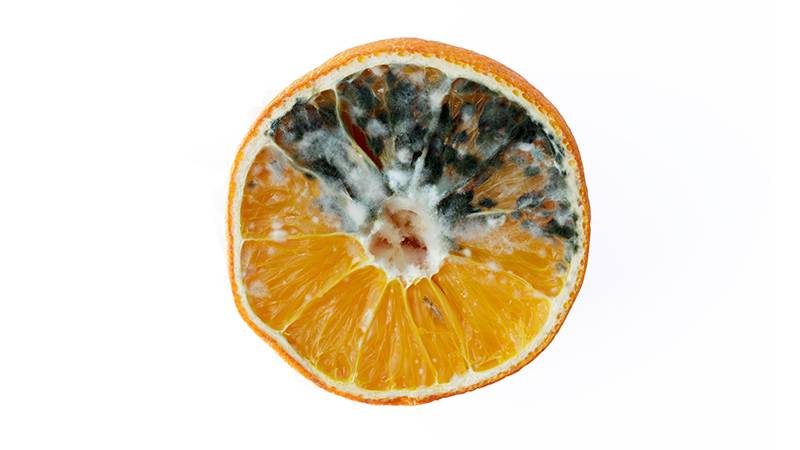
A common concern many gardeners have when adding orange peels to their compost is the potential for mold growth. It’s true that under certain conditions, mold can develop on citrus peels, but this isn’t exclusive to oranges. Most organic waste, if not managed properly, can become a breeding ground for mold.
Mold typically thrives in environments that are overly moist and lack proper aeration. When composting orange peels, it’s essential to maintain a balanced moisture level. The compost should be damp, like a wrung-out sponge, but not soggy.
To prevent mold growth:
- Ensure regular turning of the compost to improve aeration.
- Balance wet ingredients, like orange peels, with dry ‘browns’ such as leaves or straw.
- Monitor the compost’s moisture and adjust as needed.
Remember, in the world of sustainable gardening, occasional mold isn’t a disaster. It’s a sign of decomposition. However, managing it ensures a healthier composting process.
Are Citrus Peels Safe for Worm Composting?
Vermicomposting, or worm composting, is a popular method among sustainable gardening enthusiasts. But when it comes to adding citrus peels, like those from oranges, many are hesitant. So, is it safe?
In moderation, citrus peels can be introduced to worm bins. However, it’s essential to be cautious. The volatile citrus compounds in fresh orange peels can be strong for our wriggly friends, potentially causing irritation.
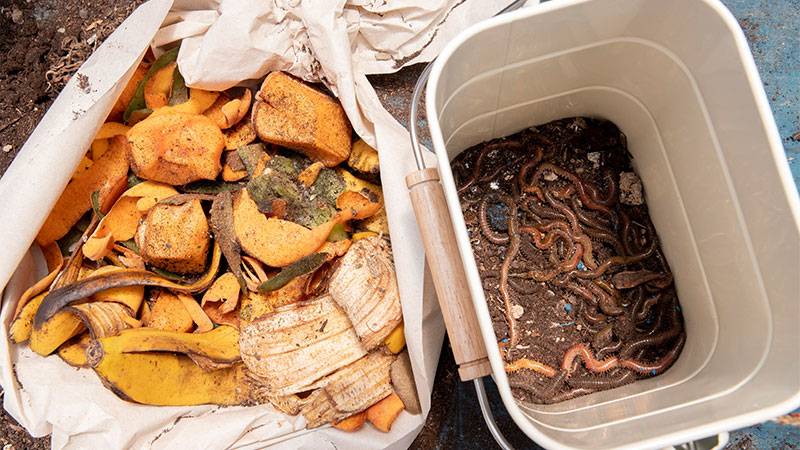
Tips for Introducing Citrus Peels to Worm Bins
- Start Small: Begin by adding small amounts of shredded orange peels and observe how the worms react.
- Balance with Browns: Mix citrus peels with carbon-rich ‘browns’ like cardboard or paper to neutralize potential acidity.
- Pre-treatment: Consider freezing and then thawing orange peels before adding them to the worm bin. This process can help in breaking down the peels’ cell structure, making them more worm-friendly.
By following these guidelines and always keeping the well-being of your worms in mind, you can safely incorporate citrus peels into your vermicomposting routine.
Other Ways to Use Orange Peels in Your Garden
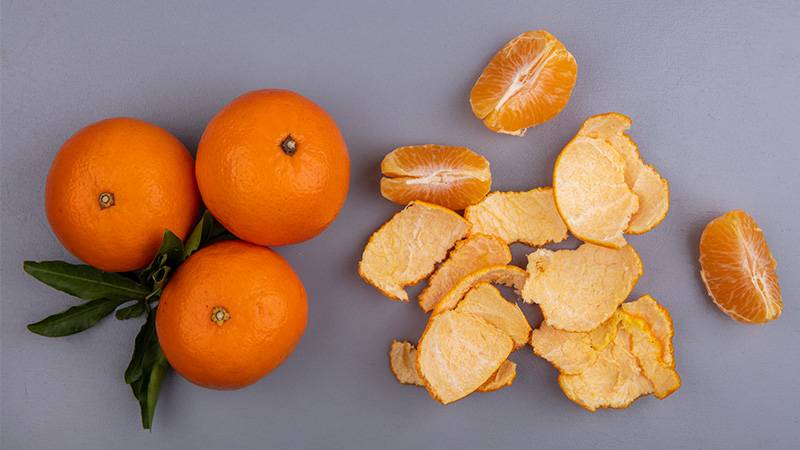
Beyond composting, orange peels have a myriad of uses in the realm of sustainable gardening. Their vibrant aroma and rich nutrient content make them a versatile addition to any garden. Here are some innovative ways to harness the power of orange peels:
Natural Pest Repellent
The strong scent of orange peels can deter certain pests. By scattering small pieces of orange peels around plants, you can keep away ants, aphids, and even cats. Additionally, a spray made from steeped orange peels can act as a repellent for soft-bodied pests.
Garden Bed Mulch
Dried and crushed orange peels can be sprinkled as a mulch around plants. Not only does this add a pop of color, but as the peels decompose, they release nutrients into the soil, giving plants a gentle boost.
DIY Orange Peel Garden Recipes
Orange Peel Vinegar Solution
Fill a jar with orange peels and top it up with white vinegar. Let it sit for 2-3 weeks. Strain the solution and mix with water in a spray bottle. Use it as a natural cleaner or pest deterrent.
Citrus Seed Starter Pots
Half an orange peel can serve as a biodegradable seed starter pot. Fill it with soil, plant your seed, and once it sprouts, transplant the whole thing into your garden.
Orange Peel Fertilizer
Blend orange peels with water to create a slurry. Dig a small trench around your plants and pour the mixture in. It acts as a slow-release fertilizer, nourishing plants over time.
Frequently Asked Questions (FAQ)
You can compost orange peels. However, concerns arise due to their acidity and the presence of volatile citrus compounds, which some believe might hinder composting processes or harm worms in vermicomposting.
Most fruits can be composted. However, it’s best to avoid composting fruits treated with pesticides or those with non-biodegradable stickers. Also, large amounts of citrus peels should be added cautiously due to their acidity.
On average, orange peels take 3 to 6 months to decompose in compost, depending on conditions like temperature, moisture, and aeration.
Yes, moldy fruit can be added to compost. Mold is a sign of decomposition, and the composting process will break down both the fruit and the mold.
Conclusion
In the journey of sustainable gardening, the question, “can you compost orange peels?” has often been a topic of debate. As we’ve explored, not only can you compost these citrusy wonders, but they also offer a plethora of benefits, from nutrient boosts to natural pest deterrence.
It’s essential, however, to approach the process with knowledge and care, ensuring that every addition to our compost pile is both beneficial and balanced. As gardeners, our choices shape the health of our gardens and the environment. So, let’s embrace the full potential of orange peels and champion sustainable composting practices. Ready to give your compost a zesty twist?

